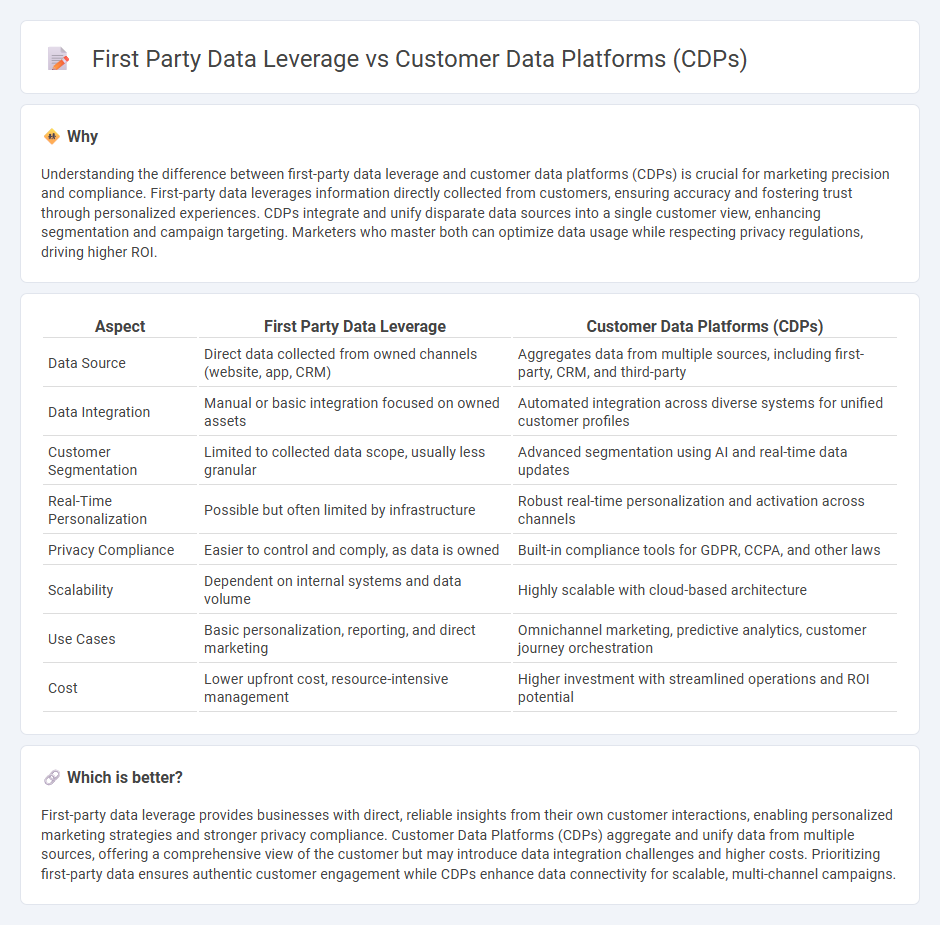
First-party data leverage focuses on utilizing directly collected customer information to create personalized marketing strategies, enhancing customer engagement and conversion rates. Customer Data Platforms (CDPs) aggregate and unify this first-party data from multiple sources, providing a comprehensive, actionable customer profile for real-time marketing decisions. Explore how integrating first-party data with advanced CDPs can transform your marketing effectiveness.
Why it is important
Understanding the difference between first-party data leverage and customer data platforms (CDPs) is crucial for marketing precision and compliance. First-party data leverages information directly collected from customers, ensuring accuracy and fostering trust through personalized experiences. CDPs integrate and unify disparate data sources into a single customer view, enhancing segmentation and campaign targeting. Marketers who master both can optimize data usage while respecting privacy regulations, driving higher ROI.
Comparison Table
| Aspect | First Party Data Leverage | Customer Data Platforms (CDPs) |
|---|---|---|
| Data Source | Direct data collected from owned channels (website, app, CRM) | Aggregates data from multiple sources, including first-party, CRM, and third-party |
| Data Integration | Manual or basic integration focused on owned assets | Automated integration across diverse systems for unified customer profiles |
| Customer Segmentation | Limited to collected data scope, usually less granular | Advanced segmentation using AI and real-time data updates |
| Real-Time Personalization | Possible but often limited by infrastructure | Robust real-time personalization and activation across channels |
| Privacy Compliance | Easier to control and comply, as data is owned | Built-in compliance tools for GDPR, CCPA, and other laws |
| Scalability | Dependent on internal systems and data volume | Highly scalable with cloud-based architecture |
| Use Cases | Basic personalization, reporting, and direct marketing | Omnichannel marketing, predictive analytics, customer journey orchestration |
| Cost | Lower upfront cost, resource-intensive management | Higher investment with streamlined operations and ROI potential |
Which is better?
First-party data leverage provides businesses with direct, reliable insights from their own customer interactions, enabling personalized marketing strategies and stronger privacy compliance. Customer Data Platforms (CDPs) aggregate and unify data from multiple sources, offering a comprehensive view of the customer but may introduce data integration challenges and higher costs. Prioritizing first-party data ensures authentic customer engagement while CDPs enhance data connectivity for scalable, multi-channel campaigns.
Connection
First party data leverage enhances customer data platforms (CDPs) by providing accurate, consented, and rich customer information directly from interactions, purchases, and behaviors. CDPs aggregate and unify first party data into comprehensive customer profiles, enabling personalized marketing strategies and improving targeting precision. This integration empowers marketers to deliver relevant content, optimize campaigns, and drive higher customer engagement and retention.
Key Terms
Data Integration
Customer Data Platforms (CDPs) centralize and unify first-party data from multiple touchpoints, enabling seamless data integration across marketing, sales, and customer service systems. Leveraging first-party data effectively requires robust integration capabilities to ensure real-time data accuracy, personalized customer experiences, and compliance with privacy regulations. Explore how advanced data integration strategies can maximize the value of CDPs and first-party data in driving business growth.
Personalization
Customer Data Platforms (CDPs) aggregate and unify first-party data from multiple touchpoints to create comprehensive, actionable customer profiles essential for advanced personalization strategies. First-party data leverage specifically emphasizes direct data collection from customer interactions, providing high-quality, consented insights that enhance targeted marketing and user experience customization. Discover how integrating CDPs with robust first-party data leverage can transform your personalization efforts and drive superior customer engagement.
Privacy Compliance
Customer Data Platforms (CDPs) centralize and unify first-party data to enhance customer insights while ensuring privacy compliance through built-in data governance and consent management features. First-party data leverage relies on direct customer interactions and owned channels, emphasizing transparency and adherence to regulations like GDPR and CCPA for lawful data usage. Discover more about how these approaches balance data utility with privacy in modern marketing strategies.
Source and External Links
Customer Data Platform - Wikipedia - A customer data platform (CDP) is a collection of software that creates a persistent, unified customer database accessible to other systems.
What is a CDP? A Complete Guide for Customer Data Platforms - A customer data platform is an advanced customer data management software solution that builds unified profiles from data across disparate data silos.
What is a Customer Data Platform (CDP)? - A customer data platform (CDP) is technology that allows businesses to pull in customer data from various channels to build a unified customer profile.
 dowidth.com
dowidth.com